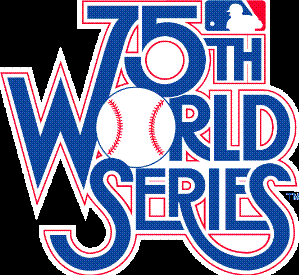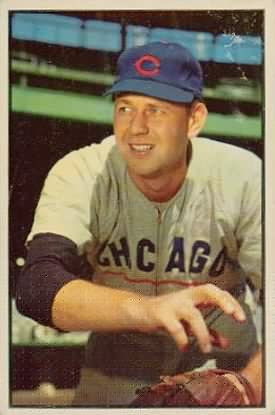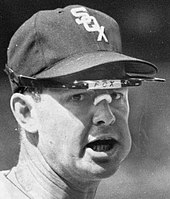
The 1978 World Series was the championship series of Major League Baseball's (MLB) 1978 season. The 75th edition of the World Series, it was a best-of-seven playoff played between the American League (AL) champion New York Yankees and the National League (NL) champion Los Angeles Dodgers. In a rematch of the previous year's World Series, the Yankees won, four games to two, to repeat as champions and to win their 22nd World Series. As of 2024, it remains the most recent World Series to feature a rematch of the previous season's matchup.

The 1977 World Series was the championship series of Major League Baseball's (MLB) 1977 season. The 74th edition of the World Series, it was a best-of-seven playoff played between the American League (AL) champion New York Yankees and the National League (NL) champion Los Angeles Dodgers. The Yankees defeated the Dodgers four games to two to win the franchise's 21st World Series championship, their first since 1962, and the first under the ownership of George Steinbrenner. Played from October 11 to 18, the Series was televised on ABC.

Theodore Bernard Kluszewski, nicknamed "Big Klu", was an American professional baseball player, best known as a power-hitting first baseman for the Cincinnati Reds teams of the 1950s. He played from 1947 through 1961 with four teams in Major League Baseball (MLB), spending 11 of those 15 seasons with the Reds, and became famous for his bulging biceps and mammoth home runs.

Juan Cespedes Uribe Tena is a Dominican former professional baseball infielder. He played shortstop, third base and second base during his career in Major League Baseball (MLB) for the Colorado Rockies, Chicago White Sox, San Francisco Giants, Los Angeles Dodgers, Atlanta Braves, New York Mets and Cleveland Indians. He bats and throws right-handed.

Charles Lenard Neal was an American professional baseball player, a second baseman and shortstop who had an eight-season career (1956–1963) in Major League Baseball.

The 2005 American League Division Series (ALDS), the opening round of the 2005 American League postseason, began on Tuesday, October 4, and ended on Monday, October 10, with the champions of the three AL divisions—along with a "wild card" team—participating in two best-of-five series. They were:

The 2005 American League Championship Series (ALCS), the second round of the 2005 American League playoffs, which determined the 2005 American League champion, matched the Central Division champion Chicago White Sox against the West Division champion Los Angeles Angels of Anaheim. The White Sox, by virtue of having the best record in the AL during the 2005 season, had the home-field advantage. The White Sox won the series four games to one to become the American League champions, and faced the Houston Astros in the 2005 World Series, in which the White Sox swept the Astros in four games to win their first World Series championship in 88 years; as a result of the 2005 All-Star Game played in Detroit, Michigan at Comerica Park on July 12, the White Sox had home-field advantage in the World Series. The series was notable both for a controversial call in Game 2 of the series, and the outstanding pitching and durability of Chicago's starting rotation, pitching four consecutive complete games; the +2⁄3 of an inning Neal Cotts pitched in the first game was the only work the White Sox bullpen saw the entire series.

The 2004 National League Division Series (NLDS), the opening round of the 2004 National League playoffs, began on Tuesday, October 5, and ended on Monday, October 11, with the champions of the three NL divisions—along with a "wild card" team—participating in two best-of-five series. They were:
The following are the baseball events of the year 1959 throughout the world.

Charles Abraham Essegian is an American former professional baseball left fielder. He appeared in 404 games in Major League Baseball (MLB) over six seasons (1958–1963) for the Philadelphia Phillies, St. Louis Cardinals, Los Angeles Dodgers, Baltimore Orioles, Kansas City Athletics and Cleveland Indians. During the 1959 World Series, Essegian, then with the Dodgers, set a Series record with two pinch-hit home runs against the Chicago White Sox. The mark was matched by Bernie Carbo of the Boston Red Sox, who a hit pair of pinch-hit homers against the Cincinnati Reds in the 1975 World Series.
The 1983 National League Championship Series was a best-of-five matchup between the West Division champion Los Angeles Dodgers and the East Division champion Philadelphia Phillies. It was the 15th NLCS in all. The Phillies beat the Dodgers, three games to one, and would go on to lose the World Series to the Baltimore Orioles.

Robert Ransom Rush was an American professional baseball pitcher who appeared in 417 games in Major League Baseball from 1948 to 1960 for the Chicago Cubs, Milwaukee Braves and Chicago White Sox. He threw and batted right-handed, stood 6 feet 4 inches (1.93 m) tall and weighed 205 pounds (93 kg). Rush was a National League All-Star selection in 1950 and 1952. Although he was a starting pitcher for the Cubs for ten seasons, and worked in 339 total games for them, he did not reach the postseason until he was a Milwaukee Brave, when he appeared in the 1958 World Series.
The 1959 Los Angeles Dodgers finished in a first-place tie with the Milwaukee Braves, with each club going 86–68. The Dodgers won the pennant as they swept the Braves in a best-of-three tie-breaker series. They went on to defeat the Chicago White Sox in the World Series in just their second season since leaving Brooklyn. The Dodgers led all 16 Major League Baseball clubs in home attendance, drawing 2,071,045 fans to Los Angeles Memorial Coliseum.
The 1959 Chicago White Sox season was the team's 59th season in the major leagues, and its 60th season overall. They finished with a record of 94–60, good enough to win the American League (AL) championship, five games ahead of the second place Cleveland Indians. It was the team's first pennant since 1919 and would be its last until their championship season of 2005.
In the 1978 Major League Baseball season, the New York Yankees defeated the Los Angeles Dodgers to win their second consecutive World Series, and 22nd overall, in a rematch of the prior season's Fall Classic. The Yankees overcame clubhouse turmoil, a mid-season managerial change, and a 14-game mid-July deficit in the American League East en route to the championship. All four teams that made the playoffs in 1977 returned for this postseason; none of the four returned to the postseason in 1979.
The 1960 Major League Baseball season was played from April 12 to October 13, 1960. It was the final season contested by 16 clubs and the final season that a 154-game schedule was played in both the American League and the National League. The AL began using the 162-game schedule the following season, with the NL following suit in 1962.
The 1976 Major League Baseball season ended with the Cincinnati Reds winning their second consecutive World Series championship.
The 1959 National League tie-breaker series was a best-of-three playoff series that extended Major League Baseball's (MLB) 1959 regular season to decide the winner of the National League (NL) pennant. The tiebreaker series was necessary after the Los Angeles Dodgers and Milwaukee Braves finished the season with identical win–loss records of 86–68 (.558) on Sunday, September 27, three games ahead of the San Francisco Giants. It was the first tie-breaker in the majors in eight years, also in the National League.
The 2005 Major League Baseball postseason was the playoff tournament of Major League Baseball for the 2005 season. The winners of the League Division Series would move on to the League Championship Series to determine the pennant winners that face each other in the World Series.


















